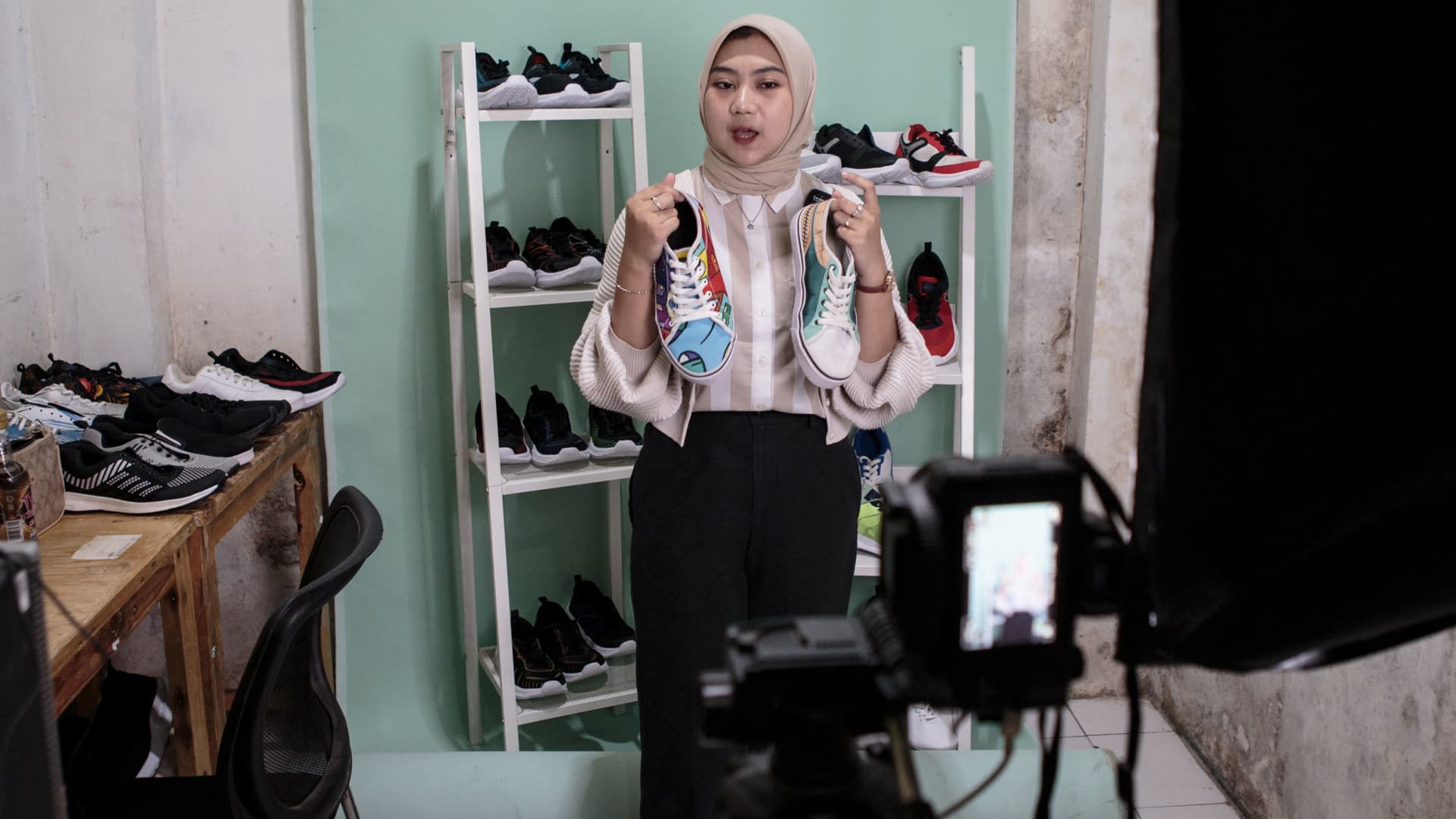TOPSHOT – A staff of a small shoe manufacturer shows their new products to make an introductory video to be posted on social media in Bogor, West Java on September 27, 2023. Indonesia has banned goods transactions on social media platforms such as TikTok, Facebook or Instagram in a new regulation, its trade minister said on September 27, as Jakarta aims to rein in direct sales on major platforms it says are harming millions of small businesses.
Aditya Aji | Afp | Getty Images
TikTok’s Southeast Asian ambitions will take a major hit after Indonesia bans shopping transactions on social media apps, analysts told CNBC.
On Wednesday, Indonesia set a one-week deadline for TikTok to become a standalone app, without any e-commerce feature. If TikTok does not comply, it faces the risk of closure in the country.
“[Being a standalone app] could introduce significant friction for existing TikTok users, negatively impacting user experiences,” said Jonathan Woo, senior research analyst at Phillip Securities Research.
Indonesia has banned e-commerce transactions on social media platforms such as TikTok Shop and Facebook. This means that users are not allowed to buy or sell goods and services through such platforms.
Even if it can secure a separate license to operate, operating as a standalone app may still be challenging.
TikTok is owned by Chinese tech giant ByteDance, and is already under scrutiny from the U.S. lawmakers who are concerned about the company’s ownership structure and ties to China.
In June, TikTok’s CEO said the app will pour “billions of dollars” into Southeast Asia over the next few years as the company looks to diversify its business globally as U.S. pressure piles up.
Indonesia is TikTok’s largest Southeast Asian market and second-largest global market with 125 million users after the U.S., according to the company.
“Given that most [purchases on TikTok] are impulse buys, the need to log into a separate app might lead to a high drop-out rate,” said Sachin Mittal, head of telecom, media and technology research at DBS Bank, in a Thursday report.
Impulse buying from watching content is an advantage TikTok has, Mittal told CNBC previously.
“Even if it can secure a separate license to operate, operating as a standalone app may still be challenging,” said Mittal.
New social media rules
On Saturday, Indonesia’s President Joko Widodo called for social media regulations, saying such platforms impact micro-, small- and medium-sized companies and the economy.
“Because we know it affects MSMEs, small businesses, micro-enterprises, and also the market, there are markets where sales have started to decline due to the influx,” he said in a statement.
Crucially, the only business affected will be challenger TikTok Shop, whose entire business model relies on social commerce.
Moving forward, Indonesia requires e-commerce platforms in the country to implement a minimum price of $100 for certain items that are directly purchased from overseas. All products offered should meet local standards.
“Crucially, the only business affected will be challenger TikTok Shop, whose entire business model relies on social commerce,” said BMI in a Tuesday report, adding that it expects to see a decline in TikTok Shop’s numbers.
TikTok Shop accounted for 5% of e-commerce’s gross merchandize value in Indonesia, according to a June report by Singapore-based consultancy Momentum Works.
TikTok Shop is trailing behind Shopee (36%), Tokopedia (35%), Lazada (10%) and Bukalapak (10%), the report said.
“In our view, TikTok Shop would have to prove that its e-commerce is a separate business from its social media, with no data sharing from the backend and possibly a clear source of funding for e-commerce losses, which was funded earlier by advertising business on its social media app,” said Mittal.
TikTok ‘deeply concerned’
In response to the Indonesia’s latest move, TikTok said that it will respect local rules and regulations.
“We are deeply concerned about [the] announcement, particularly how it would impact the livelihoods of the 6 million sellers and nearly 7 million affiliate creators who use TikTok Shop,” a TikTok spokesperson told CNBC.
“We respect local laws and regulations and will be pursuing a constructive path forward,” the person added.
This comes as TikTok has been looking for growth outside the U.S., as Chinese-owned apps face political headwinds. Its flagship app was banned in Montana on personal devices, the first state to do so, as well as in India.
TikTok Shop has been aggressively expanding into Southeast Asia, competing against Sea’s Shopee and Alibaba’s Lazada. Those e-commerce efforts also include livestream shopping.
“In the near term, the main beneficiaries to this regulation would be existing e-commerce players like Shopee and GoTo,” said Woo of Phillip Securities Research.
E-commerce marketplaces account for a significant share of Indonesia’s digital payment figures, said BMI.
In July, the value of digital transactions in Southeast Asia’s largest economy reached an all-time high of 160 trillion Indonesian rupiah ($10.3 billion) and transaction volume amounted to 1.7 trillion. Both metrics were up 65.8% and 71.5% respectively, compared to the same period a year ago, according to BMI.
